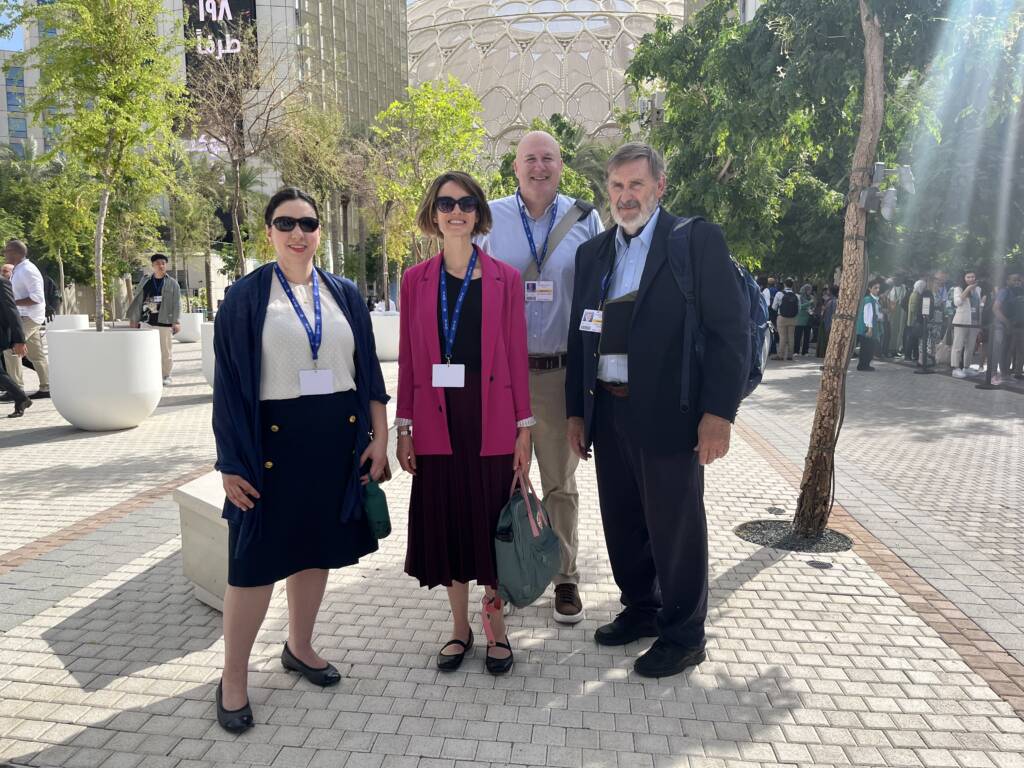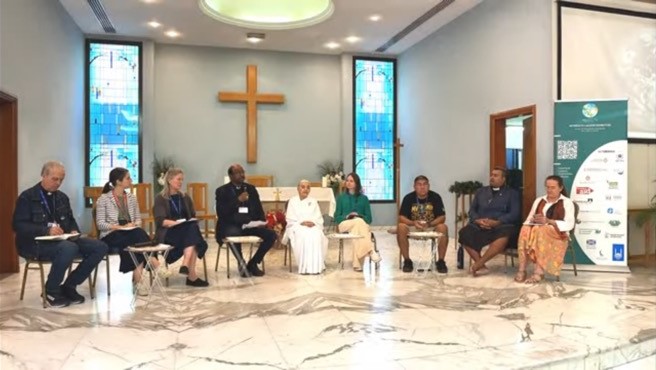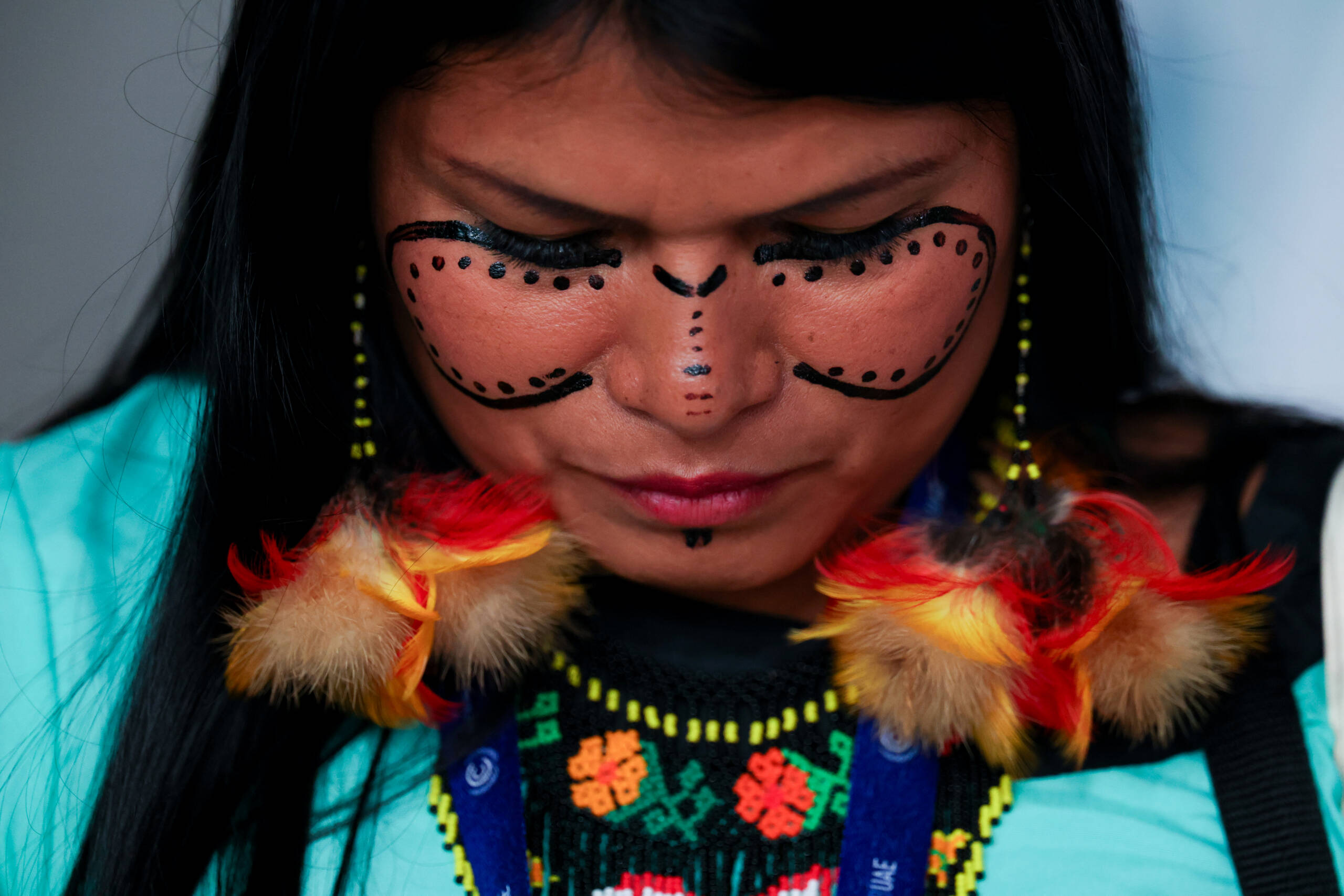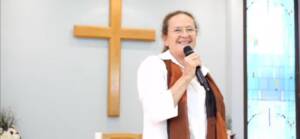by Christina Cosby, Domestic Policy Representative in the Presbyterian Church (USA) Office of Public Witness
The mantra “Unite. Act. Deliver.” grounds UN Parties and Observers alike as COP28 kicks off in the heart of the United Arab Emirates (UAE), Dubai’s Expo City. Today marked the beginning of our COP28 experience. in line to retrieve our badges, relationships began to form, and the corners of the globe converged as fellow participants shared stories of their journey leading to COP28.

PCUSA Delegation after entering COP28 Blue Zone at Expo City. Photo taken by a member of the WCC delegation
Right away our delegation realized the gravity of the road ahead as a Bangladesh participant shared the somber news regarding the recent passing of Saleemul Huq, a climate change ‘revolutionary’ from Bangladesh. This set a poignant tone for the day, as the opening ceremony paused to remember his contributions to Loss and Damage, alongside the passing of other climate heroes and ‘civilian lives lost in Gaza’. This encounter underscored the importance of storytelling in the context of climate experiences, collaboration among climate scientists and activists, the need to pause and remember those who paved the way for COP28, and our duty to work toward more just action these next two weeks recognizing the real impacts text and policy imposed on human life.

Interfaith Panel shares at the Talaona Dialogues held November 30th at Christ Church in Jebel Ali . Screenshot taken from event livestream
Past the lines and as we entered the gates, a myriad of languages filled the air reminding us of the multitude of voices gathered here to be heard. As this COP in its twenty-eighth session gathers to ‘Unite, Act, and Deliver’ on climate change promises, commits to transparency in the first-ever Global Stocktake, and reorients priorities with Climate Finance policy, the decisions made here will shape tomorrow’s generation. The urgency of the climate crisis demands that we act now, not leaving it to future generations to solve—even as we prioritize voices from the youth contingency among us.
COP28 President Dr. Sultan Al Jaber addressed those gathered, stating,
“And allow me also to extend my gratitude to every person in this room. We come from different nations, different backgrounds, and different generations. Yet we share something vital. At some point in each of our lives, we all made a choice. A choice to help carry the burden of a great responsibility to raise our hands and bear some portion of the weight on our shoulders. That choice is why we’re all here in the United Arab Emirates today.”

NOVEMBER 30: An indigenous community member attends the UNFCCC Formal Opening of COP28 during the UN Climate Change Conference COP28 at Expo City Dubai on November 30, 2023, in Dubai, United Arab Emirates. (Photo by COP28 / Christopher Pike)
Referring to the UAE’s responsibility as COP28 host he continued,
“We feel, as you feel, the urgency of this work. And we see, as you see, that the world has reached a crossroads. And yes, since Paris, we have made some progress. But we also know that the road we have been on will not get us to our destination in time. The science has spoken. It has confirmed that the moment is now to find a new road, a road wide enough for all of us, free of the obstacles and detours of the past.”
Concluding his speech during the Opening Ceremony of COP28, President Dr. Sultan Al Jaber emphasized that we must not waste time these next two weeks and we must bring everyone along on this new road. Setting the stage well for the Interfaith Gathering in the Spirit of Talanoa Dialogue gathering directly following the opening remarks.
The Interfaith Gathering in the Spirit of Talanoa Dialogue convinced faith leaders from various spiritual expressions and global nations to seek wisdom from vulnerable voices. A rabbi among us reminded us that the Climate Crisis is a spiritual crisis, with spiritual solutions, and that as spiritual people we have spiritual practices to guide the way. With 85% of the world’s population claiming a spiritual practice, these practices can and must guide us as leaders of faith to ‘Unite, Act, and Deliver on climate policy, uplifting vulnerable voices from around the world gathered here in Dubai these two weeks for COP28.

Ms. Valeriane Bernard, Co-chair of the UNFCC Interfaith Liaison Committee brings greetings at Christ Church in Jebel Ali for the Talanoa Interfaith Dialogue held Nov 30th. Screenshot from event Livestream
The day concluded with an interfaith worship service and a time of food and fellowship, offering a perfect bookend to the day as stories once again filled the air. These stories breathe life into policy text, reflecting where we have been, asking where we want to go, and pondering how we might get there. These prompts and faithful conversation guided the beginning of a statement from faith leaders that is to be delivered to the COP28 Presidency—emphasizing that the Climate Crisis is a spiritual crisis and people of faith are key to finding sustainable solutions that will be supported through policy and finance.
As we move forward, let us use the next two weeks wisely. There is much work to be done to get us to the desired goals but work toward action has already begun. In pre-meetings and along the road leading us to COP28 the United States has already committed to working with China to reduce carbon output. This is a glimmer of hope and a concrete step in the collaboration that must happen in order for us to ensure the health of our climate and the protection of fellow humanity.
As dawn breaks here in the UAE on day two, I anticipate witnessing the world continuing to unite in one place, around the critical status of our shared climate and the real impacts it has on our shared humanity and Earth putting our differences aside to discern vital solutions. The presence of church and faith leaders from various traditions in the room may surprise some, but I find encouragement in the unique perspectives we bring, using our voices to ensure that the voices of vulnerable populations are not just present at the table but listened to and prioritized when climate decisions are made, impacting their communities the most.
Find other COP28 story links here.